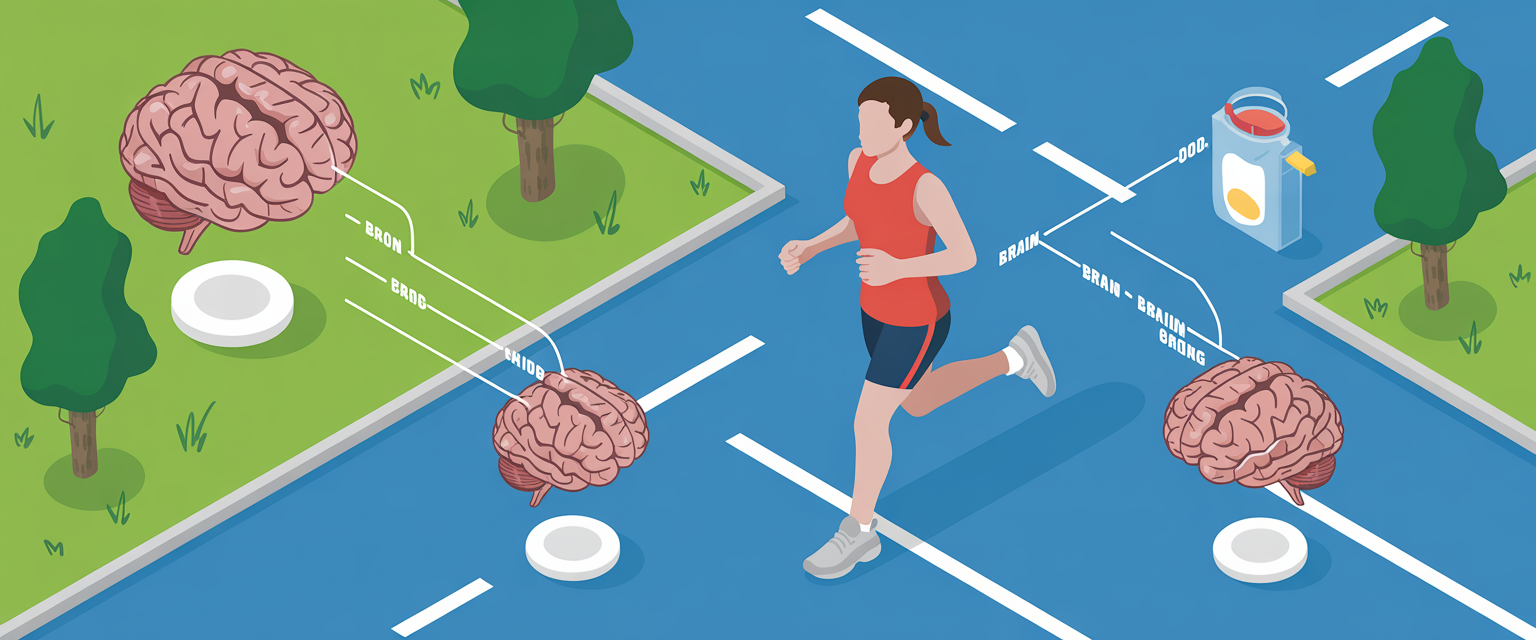How exercise rewires your brain for better mood

TL;DR
Exercise delivers powerful mental health benefits through multiple biological pathways—not just endorphins. Regular physical activity rewires your brain for better mood regulation, stress resilience, and cognitive performance by boosting neuroplasticity, optimizing neurotransmitter production, and reducing inflammation. The type, intensity, and duration of exercise all matter for maximizing these mental wellness benefits.
Why This Matters
With mental health challenges reaching epidemic proportions, understanding how exercise functions as a natural antidepressant and cognitive enhancer becomes critical for wellness-focused individuals. Unlike pharmaceutical interventions, physical activity offers immediate mood benefits while building long-term brain resilience. Research consistently shows that exercise can be as effective as medication for mild to moderate depression, while also enhancing focus, memory, and stress tolerance. For health-conscious consumers seeking natural mental health solutions, exercise represents one of the most powerful and accessible interventions available.
What the Science Shows
Beyond the Endorphin Myth:
While endorphins get most of the credit for exercise's mood-boosting effects, the reality is far more complex and interesting. Dr. Eduardo Esteban Bustamante, who directs the Healthy Kids Lab at the University of Illinois Chicago, and Dr. Jack Raglin from Indiana University's kinesiology department represent the cutting edge of research revealing exercise's true mental health mechanisms.
The Real Brain Chemistry Changes:
Exercise triggers a cascade of neurochemical changes that fundamentally improve brain function:
- BDNF (Brain-Derived Neurotrophic Factor) Production: Physical activity increases BDNF by up to 300%, acting like fertilizer for brain cells and promoting the growth of new neural connections
- Neurotransmitter Optimization: Exercise naturally balances serotonin, dopamine, and norepinephrine—the same chemicals targeted by antidepressant medications
- Inflammation Reduction: Regular physical activity reduces inflammatory markers like IL-6 and TNF-alpha that contribute to depression and cognitive decline
- Stress Hormone Regulation: Exercise helps normalize cortisol patterns, improving your body's ability to handle daily stressors
Neuroplasticity Enhancement:
Perhaps most importantly, exercise literally reshapes your brain. Studies using brain imaging show that regular physical activity increases gray matter volume in areas responsible for mood regulation, memory, and executive function. This neuroplasticity means your brain becomes more resilient and adaptable over time.
The Wellness Angle
Exercise Type Matters for Mental Health:
Different types of physical activity provide distinct mental health benefits:
Aerobic Exercise: Running, cycling, and swimming excel at boosting mood through neurotransmitter optimization. Even 20-30 minutes of moderate aerobic activity can provide immediate anxiety relief and mood elevation that lasts 2-4 hours.
Resistance Training: Weight lifting and bodyweight exercises build confidence and self-efficacy while providing unique stress-relief benefits. The focused attention required during strength training creates a meditative state that quiets anxious thoughts.
Mind-Body Activities: Yoga, tai chi, and similar practices combine physical movement with mindfulness, offering dual benefits for stress reduction and emotional regulation.
High-Intensity Interval Training (HIIT): Short bursts of intense activity followed by recovery periods may provide superior cognitive benefits by maximizing BDNF production and improving stress resilience.
Dosage and Timing Considerations:
Research reveals specific parameters for optimizing exercise's mental health benefits:
- Minimum Effective Dose: Just 15-20 minutes of moderate activity can provide measurable mood improvements
- Optimal Frequency: 3-5 sessions per week appear most beneficial for sustained mental health gains
- Intensity Sweet Spot: Moderate intensity (60-70% max heart rate) often provides the best mood benefits without excessive stress
- Timing Matters: Morning exercise may provide superior mood regulation throughout the day, while evening workouts can improve sleep quality
What You Can Do
Start with Movement Assessment:
Evaluate your current activity level and identify realistic starting points. If you're sedentary, even 10-minute walks can provide mental health benefits while building the foundation for more intensive exercise.
Choose Activities You Enjoy:
The best exercise for mental health is the one you'll actually do consistently. Whether it's dancing, hiking, swimming, or martial arts, enjoyment increases adherence and amplifies psychological benefits.
Track Mental Health Metrics:
Monitor mood, energy levels, sleep quality, and stress tolerance alongside physical fitness markers. Many people notice mental health improvements before physical changes become apparent.
Consider Natural Support:
Certain supplements can enhance exercise's mental health benefits:
- Omega-3 fatty acids support brain health and may amplify exercise-induced BDNF increases
- Magnesium helps with muscle recovery and stress management
- Adaptogenic herbs like ashwagandha can complement exercise's stress-resilience benefits
Build Progressive Routines:
Start with manageable goals and gradually increase intensity and duration. Consistency trumps intensity for mental health benefits—three 20-minute sessions weekly beat one exhausting 2-hour workout.
What to Watch
Personalized Exercise Prescriptions:
Emerging research is exploring how genetic factors, personality traits, and individual brain chemistry might inform customized exercise recommendations for optimal mental health outcomes.
Exercise as Medicine Integration:
Healthcare systems are beginning to formally prescribe exercise for mental health conditions, with some insurance companies covering fitness programs as preventive mental health interventions.
Technology-Enhanced Monitoring:
Wearable devices are becoming more sophisticated at tracking not just physical metrics but also mood, stress, and cognitive performance, allowing for real-time optimization of exercise routines.
Microworkout Research:
Studies are investigating whether very short bursts of activity throughout the day might provide mental health benefits comparable to longer, structured workouts—potentially revolutionizing exercise recommendations for busy professionals.
Bottom Line
Exercise functions as a powerful, natural antidepressant and cognitive enhancer through multiple biological pathways that go far beyond endorphins. The key is finding sustainable activities you enjoy and maintaining consistency rather than pursuing perfect intensity. Even modest amounts of regular physical activity can provide significant mental health benefits, making exercise one of the most accessible and effective tools for optimizing mood, reducing stress, and enhancing cognitive performance in your daily wellness routine.



